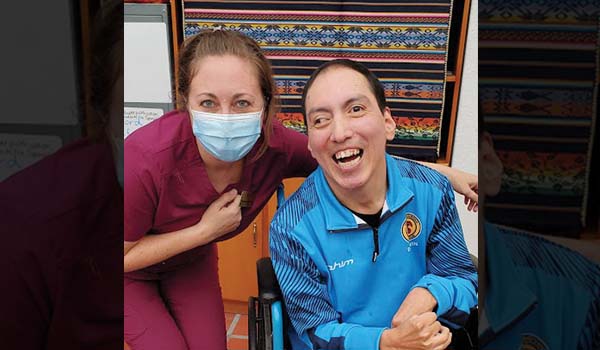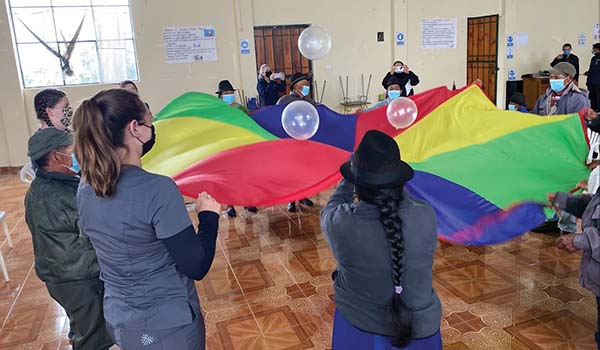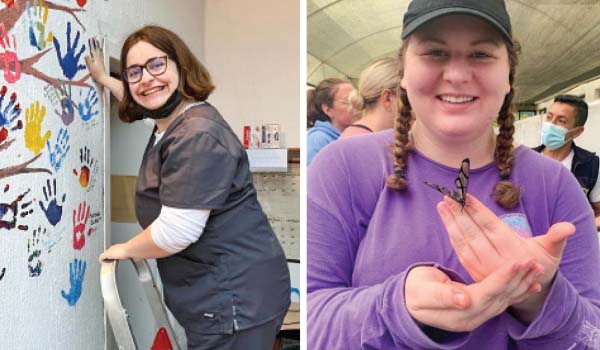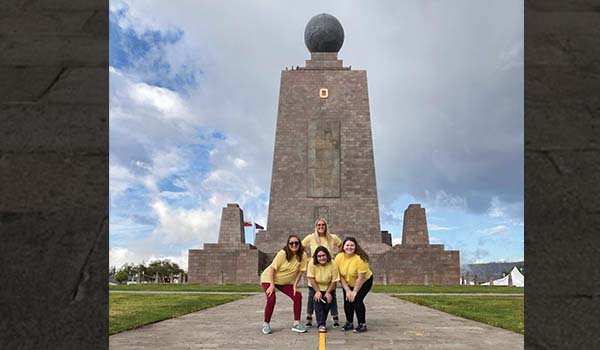“Hands that give also receive.”
This Ecuadorian proverb perfectly describes the impact that the occupational therapy GIFT (Gannon: Inspired Faculty-led Travel) course to Ibarra, Ecuador had on the students and faculty, as well as the clients they treated.
It’s a short walk from the Backpacker Hostel to Centro de Rehabilitación, Educación, Capacitación, Estudios, y Recursos (CRECER), but for Amy Brzuz, OTD and students Ashley Tomasko and Brynn Wasielewski, this experience has been a long time coming. After navigating the uncertainty of planning international travel during COVID, just getting on the plane to Ecuador in May felt like an accomplishment.
Gannon’s relationship with CRECER began in 2017 after recognizing the potential for students to have an increased and active role during fieldwork.

Instructor Amy Brzuz, OTD, with a client from the Centro de Rehabilitación, Educación, Capacitación, Estudios, y Recursos.
“Sometimes in the U.S., because of laws, policies and procedures in medical settings, level one students are not allowed to participate in all the steps in the OT process … they do a lot more observing than participating in a hands-on way,” said Brzuz. “In Ecuador, the students are participating in all the sessions all the time with faculty supervisors.”
After completing three level one experiences, Wasilewski appreciated the opportunity for increased client interactions, and freedom to develop and implement her own interventions.
Intentional cultural immersion outside the clinical setting also proved indispensable. Embracing Ecuadorian culture prior to client interactions created a level of understanding and confidence to respectfully interact with CRECER’s clients.

Students engaged clients in games to work their mobility and spatial awareness.
Tomasko reflected that this cultural context provided “a more in-depth picture of how (Ecuadorians) live,” leading to a better understanding of how to approach interventions.
The Ecuador course supports Brzuz’s research with fellow OT faculty Julia Hawkins-Pokabla, OTD, and mathematics faculty David Prier, Ph.D., on student participation in international fieldwork experiences.
Students who’ve engaged have had a fuller understanding of occupational therapy at its core and have grown their patient intervention skills. Setting the GIFT course apart from domestic fieldwork, too, is the opportunity to work one-on-one with clients in addition to group settings. These settings are diverse because the clients that the students worked with ranged from pediatric to octogenarian, with each population requiring a different skillset – a challenge they readily welcomed.
This variety of interactions and interventions drives home the holistic approach of occupational therapy.
Occupational therapists aren’t restricted to medical settings; their placements and careers can also take them to schools, group homes, not-for-profits and more. Their work is not just preparing individuals to return to the workplace, but also ensuring that clients can participate in activities they want, need and are expected to do from hobbies to self-care, to work responsibilities. Having an experience that allows students flexibility in their approach and encourages creative problem-solving helps them prepare for situations they might face in their professional future.
Moving students outside the clinical environment and taking them to a community center for seniors reinforced this. While working with older populations, the practices focused more on balance and coordination under the guise of crafting and games, activities that were met with great excitement. The practice of adapting activities to different abilities while maintaining a level of respect and client appropriateness is not something unique to CRECER that students experience.

(Left) Brynn Wasielewski left her mark on the Tree of Life painting at CRECER, and her patients’ lives. (Right) Ashley Tomasko enjoyed pre-fieldwork immersion at the butterfly house in Mindo.
More important than the excitement of the experience is whether the students feel the skills they learned will last beyond their week in Ecuador. Both Tomasko and Wasielewski are now considering careers as travel OTs.
Tomasko, who will earn her master’s in Spring 2023, thoughtfully reflected that having the ability to “explore different sides of (herself) by experiencing new things every day,” helped her learn about herself as a future OT. The experience introduced new concepts as an occupational therapy student, in particular “how each individual culture can impact an occupational therapy session.”

This experience left as much of a lasting an impact on our students as it did on their clients. Wasielewski will even be making her return to Ecuador this spring on the next GIFT course as the fifth-year OT student’s hands have even more to give.
By Meagan M. Gania, director of learning abroad and international academic programs